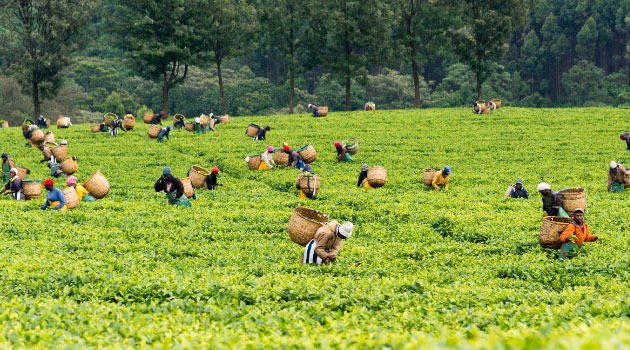
Govt Unveils Bold Reforms to Boost Tea Sector » Capital News
NAIROBI, Kenya, May 28 – Kenya’s tea sector is entering a transformative era following unveiling of sweeping reforms designed to increase value addition, enhance farmer incomes, and ensure long-term sustainability.
Agriculture Cabinet Secretary Mutahi Kagwe on Wednesday said the government has factored in key tax incentives in the 2025/2026 Finance Bill, including the removal of excise duty on tea packaging materials and the elimination of VAT on value-added tea exports.
“These measures will make it more affordable for our factories and processors to package and export value-added tea, increase competitiveness in the international markets and ultimately accelerate farmers’ income,” Said the CS.
Gacharage who spoke at Gacharage Tea factory in Murang’a during celebrations to mark International Tea Day underscored the contribution of tea in the country’s economy saying the set reforms will boost the sector and especially increase farmers’ returns.
“Tea is not just a beverage, it is a cornerstone of our economy, sustaining rural livelihoods and communities,” He stated.
Kagwe emphasized that the crop supports over 650,000 smallholder farmers and contributes nearly a quarter of the country’s foreign exchange earnings.
“We are fully committed to building a value chain that works for farmers,” he said, adding that the government aims to make the industry more competitive, fair, and profitable for producers.
Kagwe also announced government support for direct tea sales, which will allow producers to negotiate directly with international buyers.
“By cutting out the middlemen, we ensure that farmers earn what they deserve. Price transparency is no longer optional, it is a necessity,” He averred.
The CS further noted the government is in the process of establishing common-user packaging and processing facilities which will be accessible to all producers.
“These shared facilities will provide affordable access to modern packaging technology, branding services and compliance with export standards. This will be a major boost for smallholder –led value addition.” He remarked.
Kagwe encouraged smallholder tea factories to invest in value addiction, to diversify into flavoured herbal and instant and specialty teas and build strong Kenyan brands that command premium prices globally.
“I our tea factories to embrace digital marketing and e-commerce platforms to expand our reach to international consumers who are actively seeking authentic high quality teas,” He noted.
Meanwhile Kagwe said the government is working out to bring in private players in distribution of fertilizers so as to reach farmers closer to their farmers.
KTDA Chairman Chege Kirundi echoed the government’s commitment on tea reforms and emphasized the agency’s focus on farmer empowerment.
He outlined KTDA’s initiatives to promote grassroots-level value addition through specialty tea production, farmer-owned branding, and the creation of new tea-based products.
“We are turning farmers into entrepreneurs, giving them ownership not just of their farms but of their brands and markets,” he said.
Kirundi also addressed challenges such as climate change and the aging farmer population.
“We are investing in drought-resistant tea varieties and efficient irrigation systems to help farmers adapt,” he noted. “But more than that, we are investing in young people. They are the future of tea in Kenya.”
He highlighted KTDA’s efforts to attract youth to tea farming through innovation hubs, training programmes, and digital farming tools.
“If we don’t bring youth into this industry, we risk losing an entire generation of producers,” Kirundi warned.
On his part, Fairtrade Africa Executive Director Isaac Tongola offered a sobering assessment of the sector’s equity gaps.
“Only one in five Kenyan tea farmers earns enough to meet their families’ basic needs,” Tongola revealed, citing a recent joint study by Fairtrade Africa and the Fairtrade Foundation.
He noted that rising production costs, stagnant global tea prices, and climate shocks continue to erode farmer profits.
“This is not merely about sustainability. This is about justice,” he remarked. “It is about recognizing the value of those who feed, nourish, and sustain us.”
Tongola also raised concerns about new global compliance obligations, including the European Union’s Corporate Sustainability Due Diligence Directive, which he said could overwhelm smallholder farmers.
“These regulations, while well-intentioned, often place heavy burdens on those least equipped to comply,” he said.
The Tea Board of Kenya Chairman Mr. Ndung’u Gathenji provided a visionary blueprint for the future of the tea sector.
“Kenya’s tea sector has long been a global leader, renowned for quality, volume, and consistency,” He said. “But as we celebrate our achievements, we must also confront the realities of climate change, labour concerns, market access barriers, and deforestation.” He noted.
Gathenji outlined pillars of reform, beginning with environmental stewardship saying sustainability starts with protecting the land and ecosystems that make tea cultivation possible,” he said.
He noted that the Board is working to reduce reliance on wood fuel by helping factories transition to renewable energy sources such as biomass briquettes, solar, and mini-hydro power.
“This will not only lower emissions but also reduce deforestation and align us with Kenya’s national climate goals,” Gathenji added.
On value addition and marketing, Gathenji urged stakeholders to stop being mere exporters of bulk tea.
“Let us not just be exporters of tea leaves. Let us be exporters of Kenyan brands, Kenyan stories, and Kenyan value,” He added.
Gathenji also announced plans to review the Tea Act (2020) to enshrine sustainability in law and proposed the establishment of a Tea Sustainability Council to oversee progress.
Commercial Counsellor, High Commissioner of Pakistan Adeela Younis said her country is one of major importers of Kenyan tea.
He urged farmers to continue producing quality tea underscoring strengthening bilateral trade between Kenya and Pakistan.
“Kenyan tea is widely consumed in Pakistan and we will continue to partner with Kenya in doing trade.” She added.